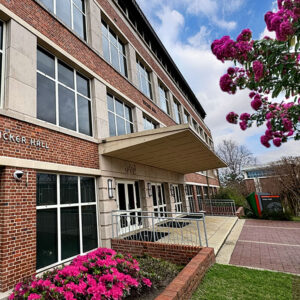News | June 12th, 2020
Black Protesters Are Facing Two Pandemics
By: Shadell Bromell

The killing of George Floyd on May 25 birthed a nationwide outrage. Millions of people are standing in solidarity against police brutality during a global pandemic, but on the frontline is the African American community.
According to CNN, the coronavirus is killing African Americans at a disproportionately higher rate compared to all other ethnicities. Many Black protesters are beginning to express how preposterous it is to have to fight two pandemics, racism and COVID-19, at once.
Black protesters are fighting for those who fell victim to police brutality and demanding authorities to defund the police while facing a pandemic that is devastating their community.
“We can make a vaccine for coronavirus, but we can’t make a vaccine for racism,” said Kwame Gatlin, a Tallahassee protestor.
Gatlin and his mother were tested for the virus in April. Although he is going to get tested again, he is concerned with the biased health care he may receive when he has to disclose his recent whereabouts. The Tallahassee native believes if any symptoms arise they may not be taken as seriously.
Nevertheless, he still encourages those protesting to get tested after, even if their mistrust of the healthcare system prevails. Gatlin believes that protesters should be concerned for their health, but rectifying the state of the nation is of equal importance.
“As much as the global pandemic is affecting us, I think police brutality is just as dangerous,” said Gatlin. “It has been much more pervasive and will continue to be more pervasive than the coronavirus.”
As of this week, Tallahassee, Fla. has a total of 434 positive COVID-19 cases. Of those reportedly infected, Black people account for 55% of those cases. In 2019, it was reported that the police killed 1,099 people. Black people were 23% of those killed despite being only 13% of the population.
“African Americans also have a COVID-19 mortality rate that is three times higher than the rate of white people.“
Many Black protesters are more concerned with the likelihood of being killed by police brutality than being infected by the coronavirus. With that in mind, The Institute of Medicine released a report documenting that “racial and ethnic minorities receive lower-quality health care than white people” due to racial discrimination in the medical field. African Americans also have a COVID-19 mortality rate that is three times higher than the rate of white people. More than 20,000 have died from the coronavirus including Rana Zoe Mungin, who was twice denied COVID-19 testing after exhibiting various symptoms. Mungin’s conditions were dismissed as a “panic attack” by an EMT. She struggled for her life for over a month after finally being diagnosed with the virus and later died April 26.
“I totally understand the need for the protests,” said Tanya Tatum, Florida A&M University Health Director. However, from Tatum’s perspective “just being around that many people, in large groups, increases your risk of exposure.”
Tatum currently oversees FAMU’s walk-up testing site located at Bragg Stadium. Students, staff and locals are encouraged to get tested. The site officially opened April 25 and provided 200 tests a day for two weeks. With such a successful turn-out, the university increased the staff and extended operations to June 15, with 400 available tests a day. The site has processed more than 8,400 tests since its opening. FAMU assures one does not have to be experiencing symptoms to receive a test.
“We wanted to reduce barriers so that people can get tested… and feel they have the means and knowledge to take care of themselves,” said Tatum.
“We’d rather risk our lives with the coronavirus to get our point across.”
Tallahassee consecutively fought against police brutality for over 10 days through marches to the police station, sit-ins, car caravans, candlelight memorials and rallies at the Capitol.
Chancellor Crump, along with other individuals, helped organize many local protests this past week. The activist, who is the son of civil rights attorney Benjamin Crump, is no stranger to demanding a change.
“We’d rather risk our lives with the coronavirus to get our point across,” said Crump.
However, he does believe he must emphasize his voice to the younger crowd and ensure protesters are being safe by wearing masks. Crump admits protesters aren’t always remaining a safe distance and even said protesters may be seen holding hands throughout the march. Therefore, he encourages protesters to get tested, even if they are at risk of experiencing racial discrimination.
“The number one concern right now is our safety,” said Crump.






